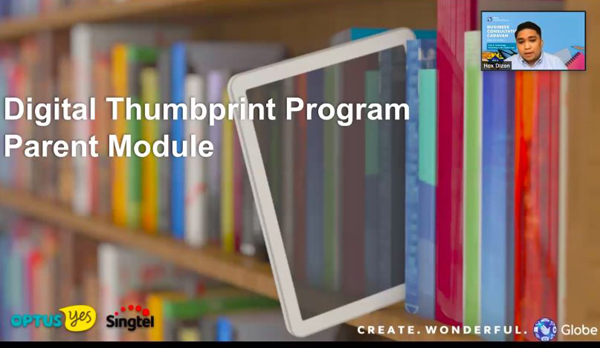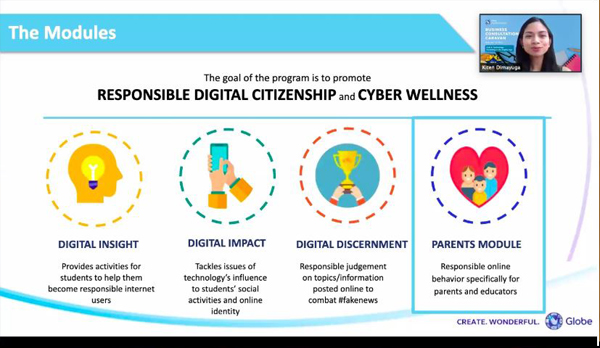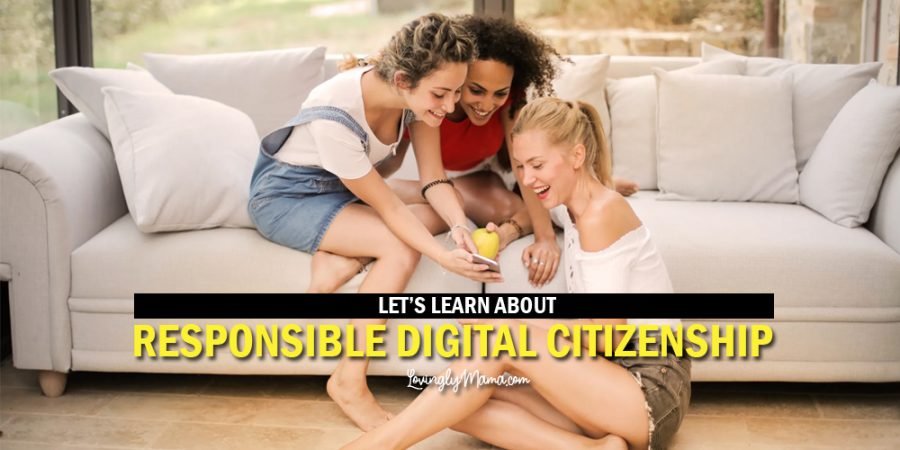More people are using gadgets and connecting online with home study programs. This is unavoidable because of the Covid-19 pandemic and students are mandated to stay at home. Since we do not have formal lessons on online ethics and etiquette, many unpleasant situations happen. Globe Telecom is concerned about that. So they are us giving tips on how to become responsible digital citizens. Let’s all learn together.
Becoming Responsible Digital Citizens
With community quarantine guidelines, families are expected to use the internet more as they stay safe at home. But longer screen time connected to the internet also comes greater risks. These include cyberbullying, threats, and even crimes.
To minimize risks and promote responsible digital citizenship, Globe held the first Kids & Tech: Parenting in the Digital Age. It is an exclusive webinar that teaches families to become savvy consumers of social media and technology.

The panel included representatives from Globe myBusiness. These are Georges Dizon, Business Enablement and Training Manager, and Maybe Lynn Tarroja, Customer Development Manager.
It was moderated by Kristen Dimayuga, program lead for education–Corporate Communications Group of Globe.
Through the webinar, Globe aims to increase responsible digital citizenship among parents and children.
Parent Module
The panelists shared the Parent Module, a family-oriented approach to digital citizenship.
It follows the framework of the Digital Thumbprint Program (DTP), a series of workshops for students on how to cultivate a safer online environment. In the webinar, guests learned about the common risks of going online and how to protect themselves.

Dealing with Bullying
A study by UNICEF reported that cyberbullying affects 70% of young people worldwide. It’s also established that children are embarrassed about opening up to their parents about online problems. They probably feel that parents wouldn’t understand. Or they could be judgmental and just totally take away their gadgets.
“We need to clarify what happened, why it happened, and who is involved,” shares Dizon. “We also need to offer support in a positive way. It’s important for children to talk to a trusted adult.”
- Related: Praying for Kids to Tell the Truth
A trusted adult could be a parent, a teacher, or a representative of an organization like the Bantay Bata.
Your Valuable Personal Information
Hackers can get into users’ accounts by using information shared online. These include private details like full names, birthdays, mother’s maiden name, and phone numbers. Private information like these could be linked to figuring out passwords.
Have Strong Passwords
To prevent hackers from figuring out your passwords, Dizon advises having a strong password. You can achieve this by using a combination of uppercase and lowercase letters, numbers, and symbols. Avoid passwords that are related to birthdays and other important dates in your life.
Do Not Reveal Too Much Information
Other personal information can be weaponized to harm your family and home.
Travel dates and photos of expensive items like gadgets and jewelry can alert potential thieves. These photos tell them of empty homes filled with valuables.
Moreover, posting car photos with plate numbers allow anyone to trace your personal data.
When in Public
If you are using a public computer to access your digital and social media accounts, remember these:
- Log out of your account and delete search history after leaving the unit.
- Set your accounts to private.
- Bmindful of your surroundings when typing your password.
Be Wary of Hashtags
We like using hashtags, although we don’t necessarily use them properly.
However, parents are advised to protect their children from predators by not using hashtags. We do not know that some hashtags put our privacy in danger.
Something innocent for us can be used by bad people. Hashtags like #cutekids and #bathtime are used by sexual predators to look for their next victim.
There is Forever Online
Any content that people post on the internet will be there forever. Online platforms do allow users to delete their content. However, others can download or take screenshots of photos and videos before you could delete them.
“Make sure your account is private and always think twice before posting. Don’t spend too much time on social media,” Dizon advises.
Information from Credible News Sites
There are websites pretending to be credible news platforms online. Before clicking or sharing a link, check whether the source is reliable.
To be sure, always rely on trusted news sites that deliver factual data. If you follow Filipino bloggers like me, check if these are real people with credible backgrounds.
Know the Organizations that Can Help
By the way, note the numbers of organizations that can help you when trouble strikes. Remember or write down:
- #2919 – Hopeline Philippines
- #163 – Bantay Bata
Both are toll-free numbers for Globe and TM subscribers.
To reach more families, Globe can organize free online workshops for schools. They can bring the Digital Thumbprint Program to the students and teachers. Visit:
http://www1.globe.com.ph/globebridgecom/learning/digital-thumbprint.
Other Covid-19 Stories
Meanwhile, here are other stories related to Covid-19 that you might find interesting.
- Stages of Dealing with the Covid-19 Pandemic
- 3-Day Rainy Family Road Trip | Ford Ranger Wildtrak
- Homemade Fried Cauli Rice Recipe
- 3-Ingredient DIY Slime Recipe | Activity for Kids
- Lopue’s San Sebastian Online Ordering App in Bacolod | Buy Groceries Online
- Createe Kit: Design Your Own Shirt for Emotional Intelligence
- Using Covilyzer UV Sterilization Lamp Against Covid-19 and Dust Mites
- Healthy Home Habits from SM Home
- Getting a Dental Checkup During the New Normal


Thank you for this mama ? Globe Telecom does have a nice promo for their customers. Sayang lang at hindi malakas signal dito samen. 🙁
Isa din ito sa Magandang Usapin ngayon mommy sigrid.. Dahil nga Sa quarantine di natin maiiwasan ngaun ang paggamit ng gadget lalo na sa mga kabataan at anak natin dahil ito ang main source nila ngaun to learn. Good to know na may program ang GLOBE TELECOMS para ma guide ang mga magulang how to use gadgets properly.. Thanks for sharing this mommy.
So much relatable mommy. Lalo na sa panahon ngayon na halos lahat ng kids ay nasa bahay at nag-hohome school and most of the time hawak ang gadgets nila. I love the fact that Globe Telecom find ways to help parents to avoid some online problems like cyber-bullying. Now our kids can enjoy their browsing, schooling & playing without any problem. Thanks Globe Telecom.
Madaming advantages sa buhay natin nowadays ang internet pero may mga kaakibat na disadvantages rin. Its better safe than sorry, Lets all be smart and responsible using internet. Thanks for sharing.